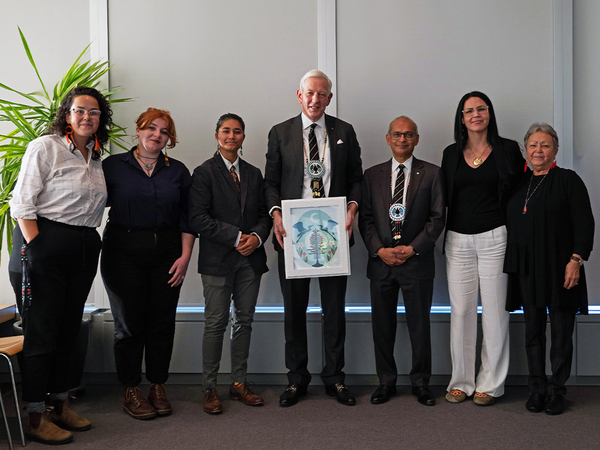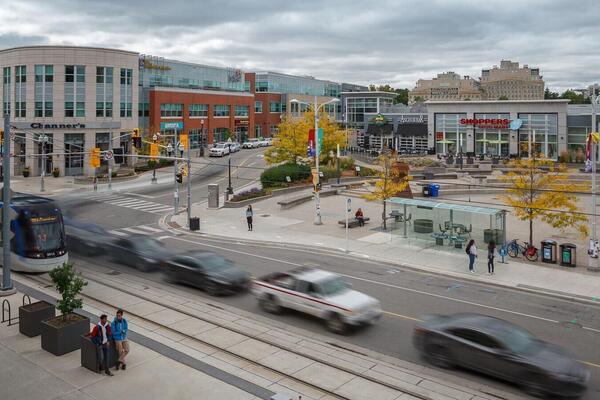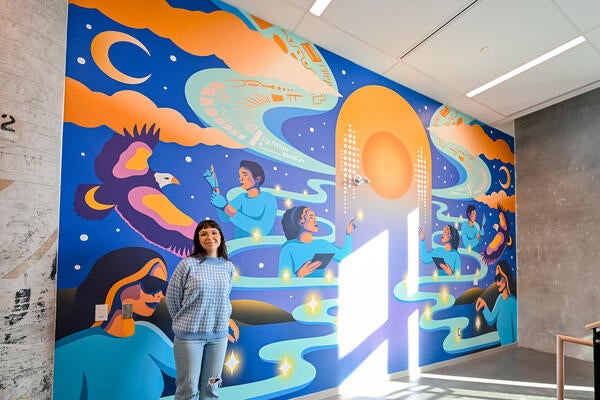
Advancing the talent evolution
Waterloo’s chancellor commits $1 million to support community-focused Indigenous students, aspiring leaders in global business and next-generation entrepreneurs

Waterloo’s chancellor commits $1 million to support community-focused Indigenous students, aspiring leaders in global business and next-generation entrepreneurs
By Claire Mastrangelo Office of AdvancementDominic Barton, the University of Waterloo's 11th chancellor, has committed $1 million to support the next generation of talent at Waterloo.
Barton is a well-known leader in global business and a philanthropist, as well as a key supporter of the University.
“Dominic has created valuable opportunities for our researchers and students during his tenure as chancellor,” says Vivek Goel, president and vice-chancellor. “I’m deeply grateful for his ongoing support, and I’m delighted that he has built on his leadership with this meaningful gift.”
Barton’s gift will fund several initiatives including a new award for Indigenous students, an international travel program in the School of Accounting and Finance and the growth of Waterloo’s entrepreneurship program, Velocity, at its new home in the Innovation Arena.
“Global forces, including rapid changes in technology, are redefining how we develop talent,” Barton says. “Waterloo excels at training the leaders of tomorrow. I’m proud to support this critical work as an ambassador of the University and as a donor.”
Members of the University community thank Dominic Barton for his support.
The chancellor’s investment will support the three pillars of Waterloo’s strategic plan, Connecting Imagination with Impact:
The gift will create an award for Indigenous students, reducing barriers to education and infusing the University with a range of new ideas and perspectives.
The Kiinomaagawin Zhoonia Award (which means “wealth of learning or teaching”) will be open to Indigenous students entering any full-time undergraduate program at Waterloo. Recipients will demonstrate a combination of academic achievement and connection or contributions to Indigenous communities. Valued at up to $40,000 each, the first awards will be available in 2023.
A portion of the chancellor’s gift will also grow the Indigenous Opportunities Fund, which supports a broad range of programs, resources and outreach for Indigenous students at Waterloo.

Dominic Barton receives a gift from Indigenous students and community members at Waterloo.
Helping to shape the business leaders of tomorrow, the chancellor’s gift will expand a highly successful travel program in the School of Accounting and Finance. The International Study Trip introduces students to the business operations of multinational firms, offering students the chance to meet directly with leaders at global corporations. The gift will fund new trips to South Asia, allowing more students to participate in the program and develop intercultural skills for the future of work.
Barton’s gift will also play a part in building the new home of the Velocity entrepreneurship program — known as the Innovation Arena — which will create more opportunities for entrepreneurs to combine research skills with business expertise and solve challenges in industry and society.
The Innovation Arena will provide business founders with access to high-tech labs, manufacturing equipment and sought-after collaboration space. These resources will equip founders to develop their products and companies, propelling economic growth in Waterloo region and Canada.
“With this gift, Dominic is opening avenues for future game changers to pursue their highest aspirations,” says President Goel. “Our University community is deeply grateful for his generosity. It will have a profound impact on students’ lives and communities worldwide.”

Read more
It Started in Waterloo: An Astronaut's Journey into the Universe of Innovation, narrated by Chris Hadfield, highlights the University of Waterloo’s role in igniting innovation within the region and beyond.

Read more
Many Hearts, One Mind by Indigenous artist Alanah Jewell celebrates the act of creation shared by the Land and innovators in our community

Read more
Here are the people and events behind some of this year’s most compelling Waterloo stories
The University of Waterloo acknowledges that much of our work takes place on the traditional territory of the Neutral, Anishinaabeg, and Haudenosaunee peoples. Our main campus is situated on the Haldimand Tract, the land granted to the Six Nations that includes six miles on each side of the Grand River. Our active work toward reconciliation takes place across our campuses through research, learning, teaching, and community building, and is co-ordinated within the Office of Indigenous Relations.